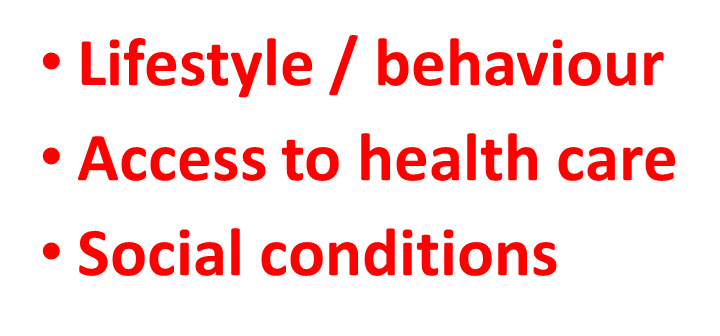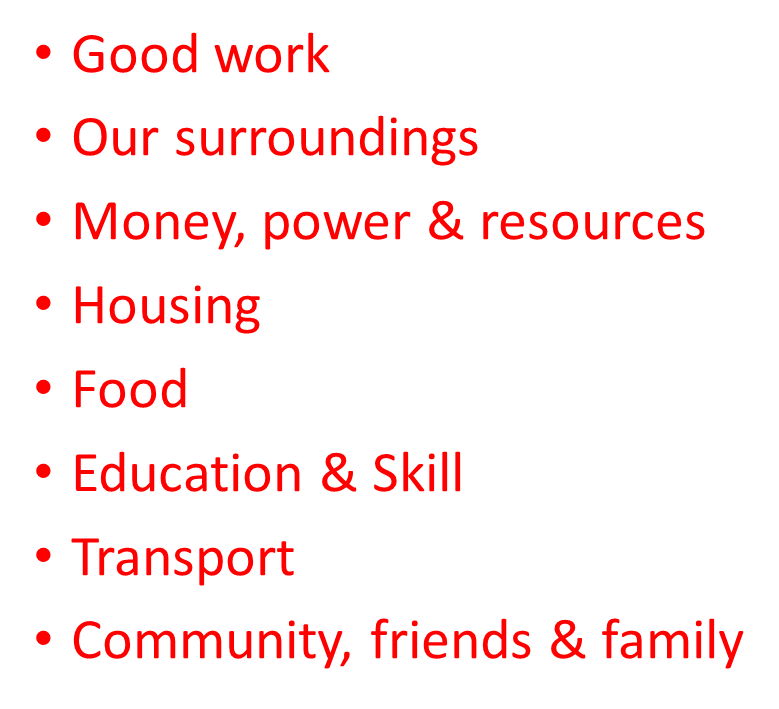Social determinants of health
1/24
There's no tags or description
Looks like no tags are added yet.
Name | Mastery | Learn | Test | Matching | Spaced | Call with Kai |
|---|
No analytics yet
Send a link to your students to track their progress
25 Terms
what causes a heart attack
blocked arteries
What causes those arteries to become blocked
stress,poor diet,lack of physical activity
what makes people feel stressed
environment
long chain of determinants cause ad effect
shapes an individuals exposure to harm,stress
SDH

the non-medical factors that influence health outcomes. They are the conditions in which people are born, grow, work, live, and age, and the wider set of forces and systems shaping the conditions of daily life

health
is created and lived by people within the settings of their everyday life; where they grow, learn, work, play and love (WHO, 1986)

The biggest influence on health?

•Lifestyle / behaviour
•Access to health care
•Social conditions

SDH relative contribution

•Social and environmental influences are highly significant, contributing to between 45% and 60% of the variation in health status.
•Kaplan & Milstein (2019) estimated that a lack of access to medical care (USA) accounts for only 10% of variation in premature deaths
•Providing universal healthcare is necessary, but insufficient to optimise the health of populations (Donkin et al. 2017).

What Makes us Healthy?

•Good work
•Our surroundings
•Money, power & resources
•Housing
•Food
•Education & Skill
•Transport
•Community, friends & family

The conditions of daily life (SDH) are shaped

by the distribution of money, power and resources locally, nationally and globally. (WHO 2008)

Different groups of people

•, experience different life circumstances through the SDH.

•How money, power and resources are distributed in society is shaped by a Government's political choices/policies

•The country's economic strength (GDP)
•The taxation policy
•Support for the vulnerable through welfare systems
•Education, employment, housing policy etc.
•
•Political choices are shaped by the values and culture of a society

Inequalities in health are socially produced
(WHO 1986)

If health is created in the settings of every day life (the SDH) and the SDH have the biggest impact on population health....
And experiencing good or poor conditions of daily life depend on the distribution of power, money and resources...
Do we all have the same opportunity to experience healthy environments and opportunities and how big are the differences in health outcomes?

Fair or unfair distribution of Money, Power & Resources?

•UK is the 6th richest economy in the world with a Gross Domestic product (GDP) of £2.2 Trillion
•Joseph Rowntree Foundation – Definition of poverty: ‘When a person’s resources (mainly their material resources) are not sufficient to meet their minimum needs (including social participation).’
•What % of people in the UK live in Poverty?

Fair or unfair distribution of Money, Power & Resources?

•UK is the 6th richest economy in the world with a Gross Domestic product (GDP) of £2.2 Trillion
•Joseph Rowntree Foundation – Definition of poverty: ‘When a person’s resources (mainly their material resources) are not sufficient to meet their minimum needs (including social participation).’

The Fundamental Causes of health inequality

•Health is created in the settings of everyday life – The Social Determinants of Health (SDH)
•The Social Determinants of health have the biggest impact on health
•The structural drivers of the conditions of daily life (SDH) is the distribution of money, power and resources
•How does a relatively unequal distribution of money, power and resources impact the distribution of health?

How important is your social position to your health?

Societies stratify or rank people into a hierarchy:
•What might determine your 'social position' (class, or social status) in society?
•How important is social position to your health? And how could social position impact your health?

What determines your 'social position' in society

Your social position in society can be determined by:
•the family you are born into
•where you were born
•the education level you achieve
•the job you hold (prestige)
•the income/wealth you have
•The social networks and connections you have
•your 'power' in society.

How do we measure social position?

By Socio economic position - SEClass/SEGroup /SEStatus
Other classifications:
•Education level
•Neighbourhood
•Income / wealth

Social position as 'Fundamental Cause' of health outcomes

There is a powerful association between social position and health outcomes on multiple disease and conditions. How and why?
Higher social position gives you increased access to resources:
•Money, knowledge, prestige, power and beneficial social networks.
These flexible resources allow individuals to more easily:
•Avoid exposure to ill health risks – physical or psychosocial (stress)
•Change their behaviour to a healthier behaviour when presented with information
•Seek treatment to prevent or treat ill health
Therefore, those in lower socioeconomic positions have worse health outcomes across multiple areas of health
Despite advances in medical knowledge or technology these patterns persist, because social position is the fundamental cause.

Your experience of the SDH over the Life Course

•The longer people live in stressful economic and social circumstances, the greater the physiological wear and tear they suffer, and the less likely they are to enjoy a healthy old age (WHO 2003).

The concepts within the SDH
ottawa
WHO Ottawa principles:
•Health is created in the settings of daily life.
•Health Equity – reducing of unfair and avoidable differences in health
•Improve health through the organised efforts of society – social, political, economic etc.

The concepts within the SDH
4
1: The conditions of daily life are the social determinants of health – non medical factors
2: The distribution of money, power and resources (fair or unfair?) shape the conditions of daily life – These are the Fundamental Causes
3: Peoples experience of the conditions of daily life depends on their social position in society and therefore how much they are exposed to health harming factors and their resources to avoid, control or manage risks
4: Those below the highest social position in society experience increasing unfair and avoidable exposure to health harming conditions which creates patterns in health outcomes or inequalities in health.

health inequalities
Health Inequalities (HI)
•Health inequalities are avoidable, unfair and systematic differences in health between different groups of people (Kings Fund 2022).
•...arising from the social conditions in which people are born, grow, live, work and age (WHO 2018).

What causes Health Inequalities?

•unequal distributions of social, environmental and economic conditions within societies, which shapes peoples behaviours and determines the risk of people getting ill, their ability to prevent sickness, or opportunities to have access to the right treatments (Equality Action 2014)
•The inequitable distribution of power, money, and resources are the structural drivers of those conditions of daily life (WHO 2008).
•Health inequalities result from social inequalities (Marmot 2010)
